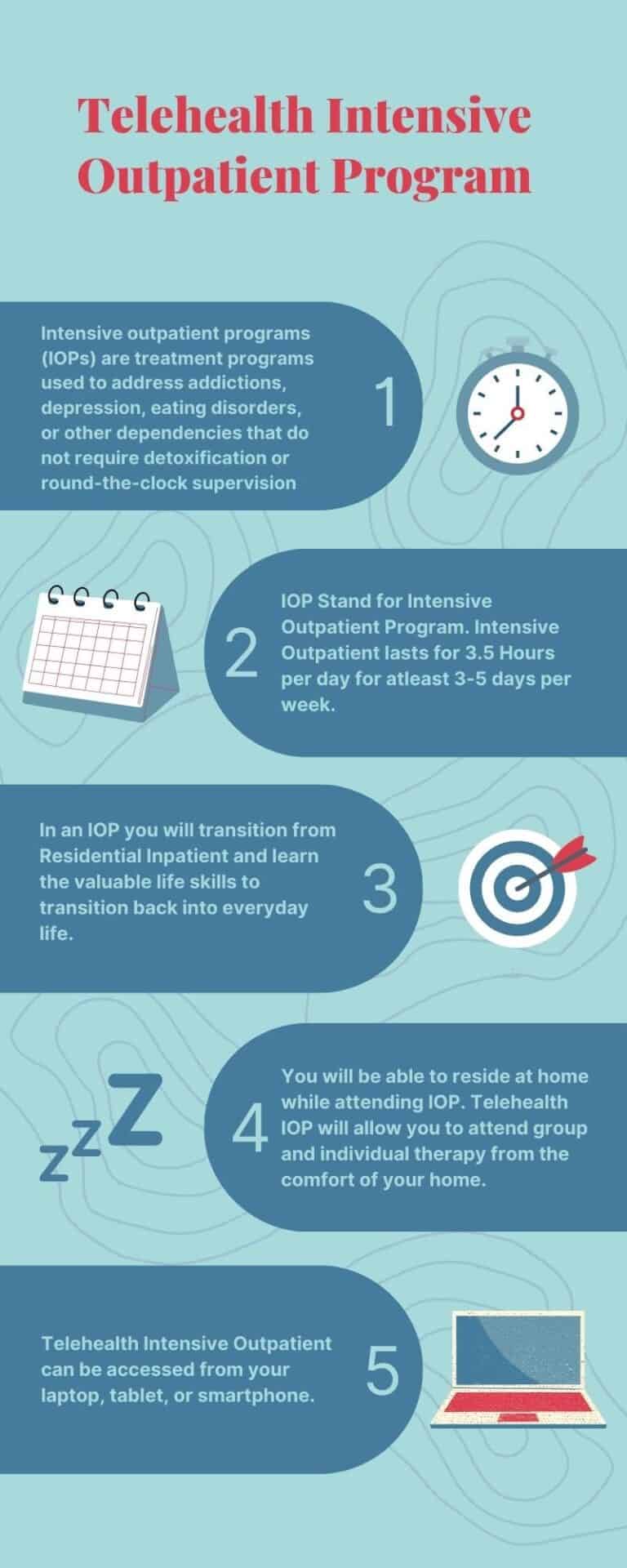Browsing the Complexities of Twin Medical Diagnosis Therapy Within an Extensive Outpatient Program Setting
In the world of psychological health and dependency therapy, the junction of double diagnosis presents a nuanced challenge that requires a detailed and tailored technique. Within the boundaries of an Extensive Outpatient Program (IOP) setting, the complexities of attending to co-occurring mental health and wellness problems and compound make use of conditions call for a fragile equilibrium of knowledge and resources to browse. The integration of evidence-based practices, joint initiatives amongst multidisciplinary teams, and a keen understanding of the distinct requirements of each person are important elements in effectively managing dual medical diagnosis within an IOP framework. By checking out the ins and outs of twin medical diagnosis treatment within this extensive outpatient context, a clearer course arises in the direction of all natural and sustainable healing for those facing these linked difficulties.
Twin Medical Diagnosis Introduction
What is the significance of understanding double diagnosis in mental health and wellness therapy? Twin diagnosis describes the co-occurrence of a substance usage condition and a mental wellness problem in an individual. It is critical to recognize and address this comorbidity as it can dramatically influence the effectiveness of psychological health and wellness therapy. Without correct recognition and monitoring of both problems, individuals may battle to achieve long-term recovery and security.
Recognizing dual medical diagnosis is important as it calls for a comprehensive and incorporated approach to therapy. By acknowledging the interplay between material usage and mental health and wellness, doctor can customize interventions to meet the unique requirements of each individual. This all natural method not just addresses signs and symptoms however additionally targets hidden variables that add to the dual diagnosis.
Moreover, unattended double medical diagnosis can result in a cycle of relapse and getting worse mental health signs. By acknowledging the complexity of twin medical diagnosis and offering customized treatment, health care specialists can support people in attaining lasting recovery and enhanced mental health.
Tailored Therapy Strategies
Acknowledging the detailed interaction between material usage problems and mental wellness problems, the growth of tailored therapy strategies is critical in addressing the intricacies of dual diagnosis in psychological wellness treatment. Tailored therapy strategies are personalized approaches that consider the one-of-a-kind demands, obstacles, and goals of individuals facing twin diagnosis. These strategies are created collaboratively by a multidisciplinary group of experts, consisting of psychiatrists, psychologists, social employees, and addiction specialists, to make certain extensive and incorporated care.
Tailored treatment plans usually include a combination of treatments, medications, and behavior interventions that target both the compound usage problem and the mental health problem simultaneously. These more helpful hints plans may consist of cognitive-behavioral therapy, dialectical behavior therapy, medication-assisted therapy, individual therapy, group treatment, and family treatment, to name a few evidence-based treatments. By personalizing therapy techniques to private circumstances, customized plans can resolve the root creates of twin medical diagnosis, promote long-term healing, and enhance general high quality of life for people fighting with co-occurring conditions.
Integrated Treatment Strategy

Additionally, the social element of incorporated treatment involves addressing environmental elements that may add to the advancement or perpetuation of substance use and mental health problems. This can consist of household dynamics, real estate instability, or lack of social assistance. By including social interventions like household treatment, employment support, and neighborhood resources, the treatment ends up being a lot more holistic and tailored to the helpful hints individual's certain needs. On the whole, an incorporated treatment strategy in dual medical diagnosis treatment within an intensive outpatient program setup aims to offer comprehensive, efficient, and personalized like individuals dealing with co-occurring disorders.
Challenges in IOP Establishing
In the context of double medical diagnosis treatment within an extensive outpatient program, browsing the complexities of co-occurring material use conditions and mental health and wellness conditions presents significant challenges. Among the main obstacles in the IOP setup is the coordination of care in between mental wellness specialists and material abuse experts to make sure an extensive therapy method. This requires efficient communication, collaboration, and a deep understanding of exactly how these problems engage and affect each other.
In addition, the changing nature of compound use problems and mental health and wellness conditions adds another layer of complexity - Intensive Outpatient Program (IOP). Clients in an IOP might experience abrupt changes in their symptoms or substance food cravings, calling for timely intervention and modification of treatment strategies. Balancing the strength of treatment and support while allowing customers the versatility to manage their daily responsibilities can be a fragile balance to maintain
Furthermore, dealing with stigma and resistance to therapy within the IOP setup can restrain progression. Some people might be reluctant to disclose their double diagnosis or might feel ashamed, impeding their interaction in the healing procedure. Getting rid of these obstacles demands a supportive and non-judgmental atmosphere that fosters count on and openness.

Collaborative Specialist Initiatives

Joint efforts also prolong to routine interaction and info sharing among group members to make sure a natural treatment strategy. Eventually, a united front of professionals working with each other enhances the performance of twin medical diagnosis therapy within an extensive outpatient program.
Verdict
To conclude, efficient double medical diagnosis therapy within an intensive outpatient program setting needs tailored treatment strategies and an integrated care strategy. Challenges may arise in this setting, but collective efforts among professionals can aid browse these complexities. By resolving the distinct requirements of individuals with co-occurring mental health and substance use conditions, IOP programs can supply comprehensive and holistic care to sustain recovery and overall wellness.
Comments on “Discover the Benefits of an Intensive Outpatient Program (IOP) for Healing”